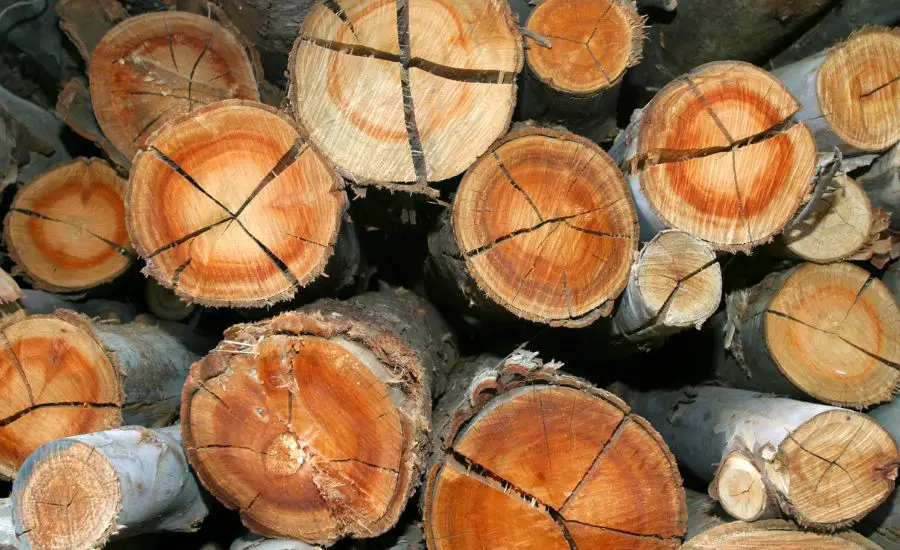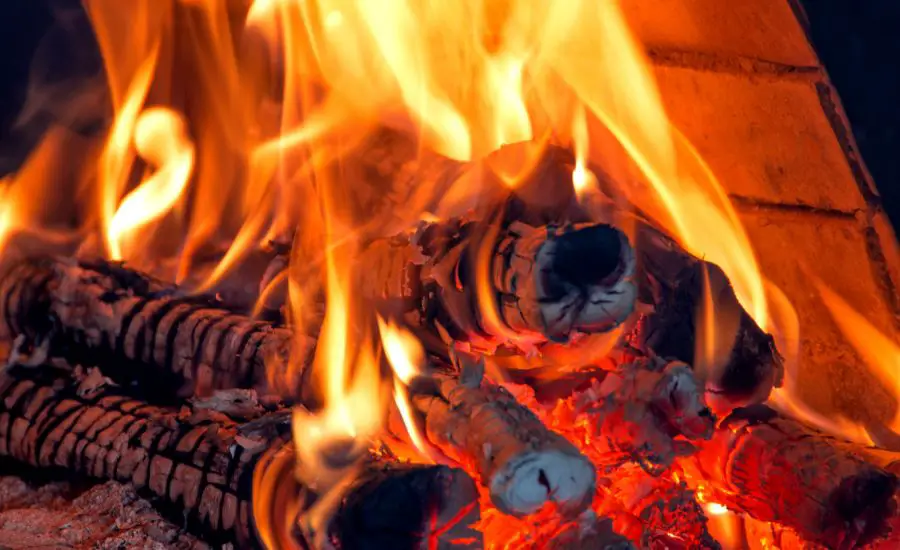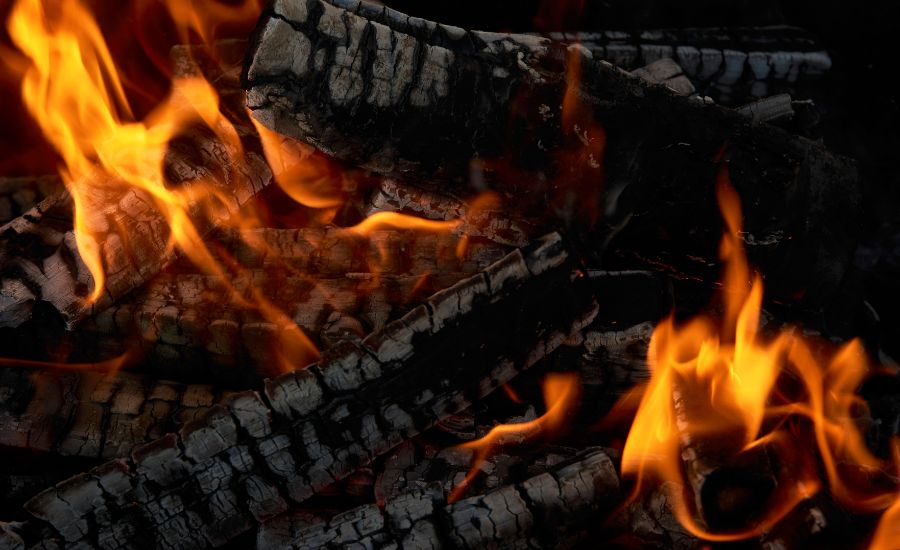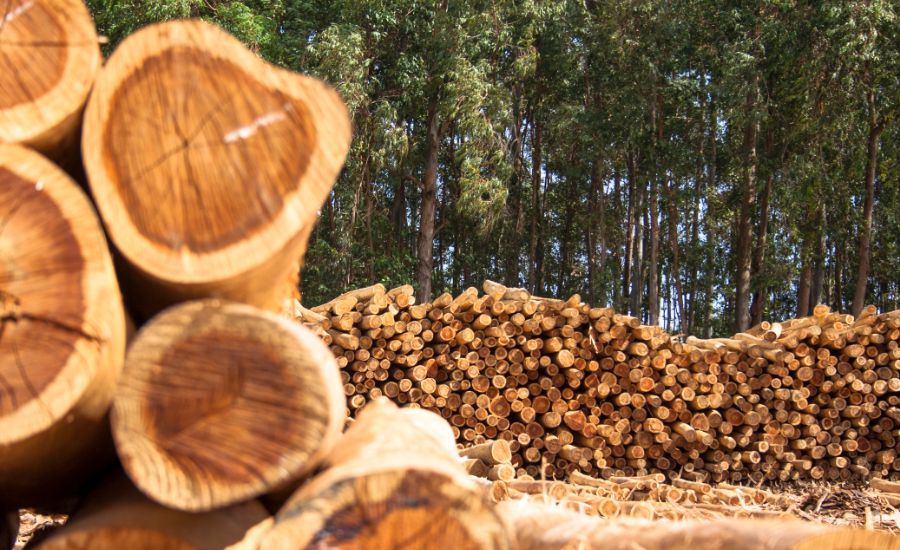Why is eucalyptus good firewood? When you select the ideal firewood for your hearth, it’s essential to consider a variety of factors. The type of wood you choose can significantly impact your overall heating experience, from the heat output to the aroma it imparts to your home. One type of wood that often piques the curiosity of firewood enthusiasts is eucalyptus.
These towering trees, known for their unique scent and distinctive leaves, have earned a reputation for being excellent firewood. In this comprehensive guide, we’ll explore the qualities of eucalyptus wood, its heat-producing capabilities, safety considerations, and more. Join us as we discover why eucalyptus lives up to its reputation as a good firewood choice.

Eucalyptus firewood: advantages and considerations
Let’s make an honest evaluation of all eucalyptus’ qualities that are critical for its role as firewood. Compare the properties of eucalyptus firewood and hackberry firewood.
Heat
When it comes to heating your home, the primary concern is often the heat output of your chosen logs. Eucalyptus, in this regard, has garnered a reputation for its exceptional heat-producing capabilities.
It’s said that eucalyptus burns hot, providing a substantial amount of warmth.
Eucalyptus firewood is known to generate a high output, often measured in British Thermal Units (BTUs per cord). Some estimates suggest that eucalyptus can produce around 34.5 million BTUs per cord. This is a significant advantage, as it means you can heat your home efficiently with fewer logs.
The secret behind eucalyptus’ remarkable heat lies in the wood itself. Eucalyptus trees, belonging to the genus Eucalyptus and commonly referred to as gum trees, have evolved in diverse and often challenging environments. To thrive in their native habitats, they’ve developed dense hardwood that burns with a very strong flame.
However, like any other firewood, the output of heat of eucalyptus is subject to seasoning eucalyptus. Seasoned eucalyptus, which has been properly dried, typically yields the best results in terms of heat production.
Green eucalyptus, on the other hand, may not burn as hot, and the moisture content can hinder its performance as firewood. Therefore, it’s crucial to season eucalyptus properly to maximize its advantages.
Smell
The fragrance of burning wood is an integral part of the experience of having a fire. When you burn eucalyptus firewood, the aroma is a topic of both curiosity and debate.
The wood of eucalyptus is known for its distinct and often pleasant fragrance. Eucalyptus leaves contain eucalyptus oil, and when the wood is burned, the oil is released into the air, infusing your space with a unique scent. This aromatic characteristic can add a delightful dimension to your fire experience, making it a favorite choice for those who appreciate a woodsy, herbal scent.
However, it’s worth noting that while some individuals find burning eucalyptus to be pleasant, others may not share the same sentiment. Some describe the fragrance of eucalyptus as intense or overpowering, or even slightly medicinal, so it’s essential to consider your personal preference and the preferences of those who will be sharing the space with you.
Another aspect to consider is the safety of burning eucalyptus firewood in terms of its fragrance. Is eucalyptus firewood poisonous? No, eucalyptus is generally considered safe to burn, however, it’s essential to ensure proper ventilation, especially if you’re burning it indoors.
Smoke
When evaluating the suitability of firewood for your needs, one crucial aspect to consider is the amount of smoke produced during combustion. Excessive smoke can be a nuisance and a health concern, particularly when burning wood indoors or in areas with poor ventilation.
Eucalyptus is generally considered to produce minimal smoke when burned properly.
However, it’s important to note that the smoke generated during the burning of eucalyptus wood can vary depending on several factors. Proper seasoning and drying of the wood play a critical role in reducing smoke output.
Unlike seasoned eucalyptus, green or unseasoned wood, which contains higher moisture levels, is more likely to produce excess smoke.
Some species of eucalyptus may produce less smoke than others due to variations in wood density, resin content, and oil composition. It’s advisable to research and select a eucalyptus tree known for its suitability as firewood in your region.

Sparks
The generation of sparks during the burning of firewood can be a cause for concern, especially when using wood in indoor fireplaces.
Eucalyptus is known for its tendency to produce sparks when burned. This is primarily due to its dense and hardwood composition, which can create friction and generate sparks as the wood burns. So it’s essential to take precautions when using it in fireplaces or wood-burning stoves, particularly in enclosed spaces.
While eucalyptus firewood may be more prone to sparking compared to some other types of firewood, proper safety measures can help mitigate any potential risks associated with its use.
Splitting
When it comes to preparing firewood for your fireplace or wood-burning stove, the process of splitting the wood can significantly impact your overall experience.
The wood from the eucalyptus is dense and hard. This dense nature can make splitting eucalyptus firewood more challenging compared to softer woods.
The wood can be tough and resistant to traditional splitting methods, such as using an axe or a log splitter.
As a result, splitting eucalyptus may require more effort and patience.
To make it less arduous to split eucalyptus firewood, consider the following tips:
- Use a sharp axe or maul.
- Split eucalyptus when the wood is properly seasoned.
- Use wedge technique (using wedges to assist in the splitting process).
While splitting eucalyptus firewood may require more effort compared to softer woods, many find that the results are worth it.
Coals
One of the key qualities that firewood enthusiasts often seek is the ability to produce long-lasting and efficient coals. Coals provide a steady source of heat, making it easier to maintain a consistent temperature in your fireplace or wood-burning stove, so whether the timber produces good coals or doesn’t may easily become a deal maker or breaker.
When properly seasoned and burned, eucalyptus firewood can produce dense and long-lasting coals. These coals continue to radiate heat even after the flames have died down. The production of excellent coals is one of the primary advantages of eucalyptus as firewood.
And one extra bonus: eucalyptus leaves very little ash after burning.
However, burning eucalyptus does result in creosote buildup, which makes cleaning the chimney a regular necessity. That is critical for chimney fire prevention.

The best types of eucalyptus trees for firewood
Eucalyptus trees are a diverse group, comprising numerous species that vary in size, shape, and wood quality. When considering eucalyptus firewood, it’s important to select the right species to ensure a positive burning experience. Here are some of the best types of eucalyptus that make excellent firewood.
Blue Gum (Eucalyptus globulus)
Blue Gum is one of the most popular eucalyptus trees for firewood. It’s known for its dense wood and excellent heat output.
Red Ironbark (Eucalyptus sideroxylon)
Red Ironbark is prized for its durability and high heat value. It’s a hardwood species that burns hot and produces long-lasting coals.
Sugar Gum (Eucalyptus cladocalyx)
Sugar Gum is another eucalyptus tree known for its firewood qualities. It has a high heat output and can produce exquisite coals when seasoned properly.
Jarrah (Eucalyptus marginata)
Jarrah is a hardwood eucalyptus tree native to Western Australia. It’s prized for its durability and resistance to decay.
Blackbutt (Eucalyptus pilularis)
Blackbutt is a type of eucalyptus trees found in eastern Australia. It’s valued for its excellent heat output and relatively low smoke production.
Red Gum (Eucalyptus camaldulensis)
Red Gum is a widely used eucalyptus species for firewood in many regions. It’s known for its high density and ability to produce long-lasting coals.
Selecting the right eucalyptus
When selecting a eucalyptus tree for firewood, it’s crucial to consider the availability of specific species in your region, as not all eucalyptus types are found everywhere.
Additionally, to get the most out of any eucalyptus firewood, preparation, proper seasoning, and storing the firewood to avoid termites are essential.
Ensure that the wood of the eucalyptus tree is well-dried before use to enhance its burning efficiency and safety.

Conclusion Is Eucalyptus Good Firewood
In the world of firewood, the choice you make can significantly impact your heating experience. Eucalyptus firewood, derived from the towering eucalyptus trees, has demonstrated its unique qualities and attributes.
A eucalyptus tree can be an excellent choice for those seeking a reliable, high-heat output fuel source with the added benefit of minimal smoke production and a unique fragrance. However, it’s essential to be aware of its challenges, such as splitting difficulty and sparking tendencies, and to take appropriate safety measures when using it.
With the right knowledge and precautions, eucalyptus firewood can provide you with a warm and enjoyable fireside experience, whether you’re heating your home or enjoying an open fire outdoors.
FAQ
Is eucalyptus OK to burn in a fireplace?
Yes, eucalyptus (a.k.a. gum trees) is generally okay to burn in a fireplace, but it’s essential to follow safety precautions due to its tendency to spark and ensure proper seasoning for efficient burning.
Does eucalyptus burn hotter than oak?
Yes, eucalyptus typically burns hotter than oak, with some estimates suggesting it can produce higher BTUs (British Thermal Units) per cord.
What is eucalyptus wood good for?
It is good for various purposes, including firewood, construction, furniture, flooring, and paper production. It’s versatile due to its durability and density.
Can you cook over eucalyptus firewood?
Yes, you can cook over eucalyptus firewood. It’s often used for barbecues, grilling, and outdoor cooking due to its high heat output and ability to produce good coals. However, ensure it’s well-seasoned and follows safety guidelines.
Is cider gum eucalyptus safe as firewood?
Yes, it’s safe to use as firewood. It produces a large amount of heat, little smoke, and a distinct unique aroma.






